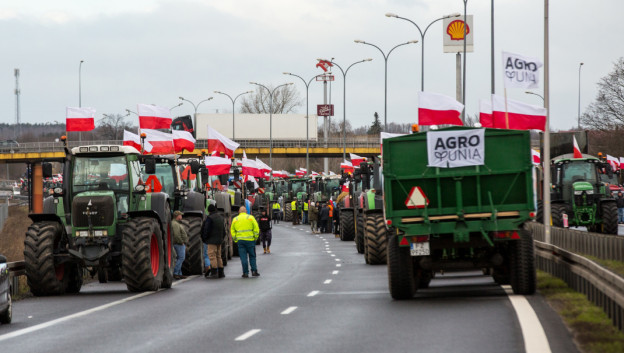Stock struggle
analysis Grains and raw materials
Yesterday at 12:30 pm – Jorvas Lugtenburg
How do we continue to support Ukraine and respond to the protesting farmers? It is a difficult conundrum for the European Commission. But this morning white smoke came from Brussels. The European Commission has presented a proposal to further regulate the import of agricultural products from Ukraine. The French Minister of Agriculture criticizes that Polish farmers did not cancel their big working day.
Mativ wheat closed above €200 for the first time this month, albeit by a small margin. The May contract added 3 euros to 200.25 euros per ton. On the Chicago Mercantile Exchange, wheat rose 1.8% to $5.52 a bushel. Corn showed a more modest increase, rising 0.8% to close at $4.39 per bushel. Soybean futures closed 0.2% lower at $11.85 a bushel.
Europe wants to limit the import of agricultural goods from Ukraine. Agreement was reached on this matter in committee this morning. In January, the Commission proposed exempting the entry of products coming from Ukraine from import duties. The “emergency brake” was only applied to poultry, eggs, and sugar products if imports of those products exceeded the reference years of 2022 and 2023. Partly due to pressure from protesting farmers, oats, corn, grits and honey have now been added to that list. The Commission's proposal still needs to pass through the European Parliament and the Council.
Wheat remains outside emergency measures
French Agriculture Minister Marc Visnot was not enthusiastic about the Commission's proposal on France Info radio. “We will have to continue working on that. This is not a position that France supports, even if there is some progress,” he added. As the EU's largest wheat producer, remaining outside import restrictions is bittersweet for France, despite the Commission's pledge to monitor imports of wheat and other grains and intervene in the event of market disruptions. According to initial reports, the EU member states, Bulgaria, Hungary, Poland, Romania and Slovakia, which border Ukraine, are not overflowing with enthusiasm for the European Commission's proposal.
The Kiev government swears that exporting agricultural products does not harm the European internal market. This is certainly no longer the case, as 95% of exports pass through the Black Sea, according to Ukraine. Kiev considers it acceptable for export limits to be based on the reference years 2022 and 2023. Adding 2021 (the year before the Russian invasion) as many EU countries want would be impractical according to Ukraine.
The European Commission's proposal is not enough for Polish farmers. They are taking to the streets en masse today. Various sources reported that the Polish police expect today 580 demonstrations and sieges, in which approximately 70,000 people will participate. In addition to importing cheap products from Ukraine, there are also protests against the Green Deal.
Ukraine's survival is at stake
US Defense Secretary Lloyd Austin warned yesterday that “Ukraine's survival is in danger.” Russia is achieving small victories on the Ukrainian front, according to Austin. “This comes at a high price, both in terms of personnel and equipment.”
Weather is another factor supporting the wheat market. A moderate frost is expected in the American prairies early next week. This in itself is not unusual at this time of year. Freezing temperatures are not uncommon in the area until mid-April. This year, winter wheat has developed relatively well. This makes the crop in states like Kansas and Oklahoma sensitive to frost damage. By the way, winter wheat is doing well. In Kansas and Oklahoma, 55% and 61% of wheat acreage, respectively, received a good or excellent rating from the USDA this week.

“Creator. Award-winning problem solver. Music evangelist. Incurable introvert.”



/s3/static.nrc.nl/wp-content/uploads/2024/04/26152545/data114819028-6ce62a.jpg)



More Stories
Britons are being warned of rising tourist phobia in Benidorm
Thousands of Spaniards support Prime Minister Pedro Sanchez and ask him to remain in office.
Repercussions and scenarios after the possible resignation of Prime Minister Pedro Sanchez in Spain